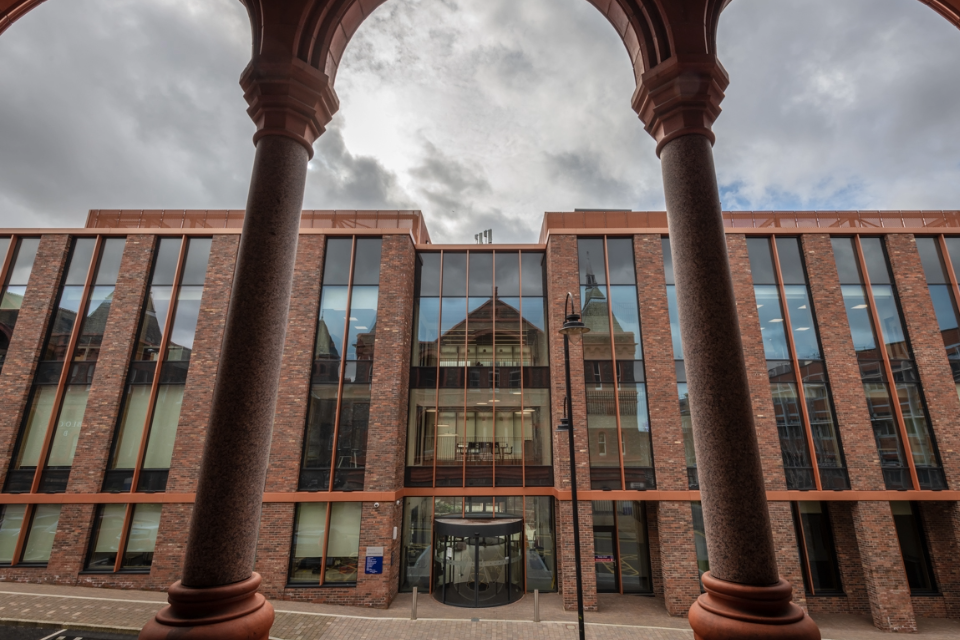
The University of Liverpool has performed strongly in Research England’s Knowledge Exchange Framework (KEF5), maintaining its position as one of the country’s leading universities for knowledge exchange.
Today (23 September), the results of the fifth iteration of KEF have been released, with the University of Liverpool again achieving strong results across several areas of knowledge exchange.
Building on previous KEF results, we continue to demonstrate very high or high engagement in six of the seven perspectives assessed.
Highlights include:
- Achieving the highest possible rating (Quintile 5) for Research Partnerships, where we exceed the cluster average, IP Commercialisation, and Working with the Public and Third Sector.
- Improving our performance in Local growth and regeneration, where we are recognised as having high engagement (Quintile 4), exceeding the cluster average.
The results also recognise our high engagement (Quintile 4) in Working with Business, and Public & Community Engagement, where we are in line with the cluster average.
Professor Tim Jones, Vice-Chancellor at the University of Liverpool, said: “We have continued to demonstrate excellent progress and maintain strong results in the latest KEF assessment, and I am delighted with the University’s performance. This highlights our commitment to collaboration and the strategic use of our Intellectual Property to create meaningful, lasting impact with global reach.
“Initiatives such as our Northern Gritstone partnership and the Liverpool City Region Life Sciences Innovation Zone are driving economic growth, developing skills, and delivering solutions with local, national, and global partners to benefit people, place, and planet. These results reflect the momentum we are building towards our Strategy 2031 vision of becoming a top 100 university worldwide.”
Cllr Mike Wharton, Liverpool City Region Deputy Mayor and Cabinet Member for Business, Investment and Trade, said: “It’s fantastic to see the University of Liverpool performing so strongly in the KEF results, particularly in local growth and regeneration. As a key anchor institution, vital to our economy and future prosperity, the University is central to our UK-leading place-based approach to innovation, where industry, academia and the public sector work hand in hand. We look forward to building on this success as we deliver the Innovation Zone, put our Plan for Prosperity into action, and work towards raising R&D investment to 5% of GVA by 2030.”
Matthew Johnson, Director of Access and Innovation at Roche Diagnostics UK and Ireland, said: “We’re pleased to see the University of Liverpool’s strong KEF results continue, which really validate the significance of our partnership. Together, we are making meaningful progress in improving lives across the Liverpool City Region through the power of diagnostics, driving innovation to ensure more people access the care they need, faster.”
KEF’s interactive dashboards have been released by Research England and can be viewed here*.
University showcase pages
Our KEF webpages highlight a range of innovative knowledge exchange activities at the University that benefit society and the wider economy. These include cross-sector collaborations such as our Healthcare Charter Partnership with Roche Diagnostics Ltd; high-potential spin-outs supported through our Northern Gritstone Partnership and Accelerator Programme with Sustainable Ventures, sponsored by the Sir Peter Rigby Centre for Enterprise; and major regional initiatives such as the Civic HealthTech Innovation Zone (CHI-Zone) and the Microbiome Acceleration, Innovation and Development (MaID) Hub, part of the Government’s national Investment Zone.
Our engagement also spans culture, arts, and science outreach, including co-hosting the British Science Festival, with many more examples available on our webpages.
Read more about KEF here.
Information for University of Liverpool staff:
Partnerships and collaborations with organisations beyond academia, such as businesses, NHS trusts, government agencies, and cultural organisations, are essential for generating income and impact – read more about the University’s knowledge exchange strategy and KEF.
Research, Partnerships and Innovation (RPI) supports these collaborations and provides resources, including the Research Partnering Toolkit, to help you achieve successful outcomes. Find out more on our Partnership Development webpages. Meanwhile, our Enterprise Team provides support for commercialising intellectual property through licensing or spin-outs, helping to maximise the impact of University research.
*If you have previously viewed KEF4, we encourage you to refresh your browser before viewing the KEF5 dashboards.